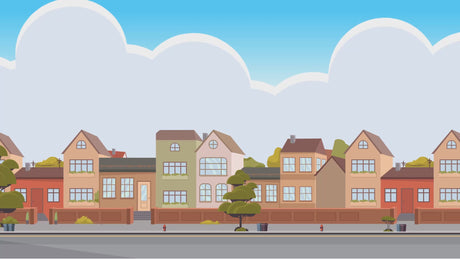You'll often see us refer to 2-wire and 3-wire lighting systems. This is an important point as many products, such as relays, cannot work if installed into a 2-wire system.
![]() This application note explains the difference between 2-wire and 3-wire lighting systems and helps you understand which version you have in your installation.
This application note explains the difference between 2-wire and 3-wire lighting systems and helps you understand which version you have in your installation.
Firstly, what do we mean by 2-wire and 3-wire systems. The simple explanation is that a 2-wire system does not include a Neutral wire at the light switch, the 3-wire system does include the Neutral at the switch.
2-wire Lighting Systems
This is the most common lighting system in Europe, almost all homes use this system, especially in the UK and Nordic regions.
The term is slightly confusing as the system will actually include three wires. However, the third wire, which typically has a green/yellow sleeve is the Earth wire. The Earth is a very important part of the electrical system and all switches, appliances and lights must be correctly earthed. But for the sake of simplicity we ignore the Earth wire when explaining wiring as it plays no active role in the day-to-day workings of your light circuits.
A 2-wire system includes two wires - Live and Switched Live.
 Figure 1: A standard 2-wire lighting System.
Figure 1: A standard 2-wire lighting System.
A standard 2-wire lighting circuit is shown in Figure 1. The brown wire is Live (also know as permanent live), this brings the live supply to the switch. The blue wire is known as the Switched Live and takes power to the light. Switched Live is only live when the switch is on (this is where it gets its name from).
Note - the switched live has a brown sleeve on it, this highlights that the wire is actually a live wire, even though it is blue, this ensure that it is not confused with a neutral wire. If you have a 2-gang or 3-gang switch you may have black and grey wires, however these will have a brown sleeve on them as they are also switched live wires.
3-wire Lighting Systems
The 3-wire system is less common than the 2-wire system, it includes a Neutral at the switch as well as the Live and Switched Live wires.
 Figure 2: One example of a 3-wire lighting System.
Figure 2: One example of a 3-wire lighting System.
An example of a 3-wire lighting circuit is shown in Figure 2. One '2-Core + Earth' cable takes Live and Neutral to the switch back box, a second cable takes the Neutral and Switched Live to the light.
Note - the Neutral is not connected to the actual switch, the two Neutrals are connected together using a connector block.
How do I know which system I have?
As the 2-wire system is the most common, it's probably best to start with the assumption that you have a 2-wire system, especially if you're in the UK or if your house is more than 3-5 years old.
You can check the following points:
- Are all the wires connected to the switch?
- Do all the wires have a brown sleeve on them?
- If the answer is YES to either of these points, you have a 2-wire system
- Do you have two blue, black or grey wires going to a connector block? If so you MAY have a 3-wire system, but you should confirm this with a voltage meter or consult a qualified electrician.
How do I know which products will work with my system?
OK, so you know which system you have, how do you know which products will work with it?
We've tried to make this as easy as we can.
Each product that can be used in a lighting system has an icon so that you can quickly see which system it is designed to work in.
| Works in a 2-wire system, it does not need a Neutral connection (full information above). | |
| Works in a 3-wire system, a Neutral is required (full information above). |
Related Information









